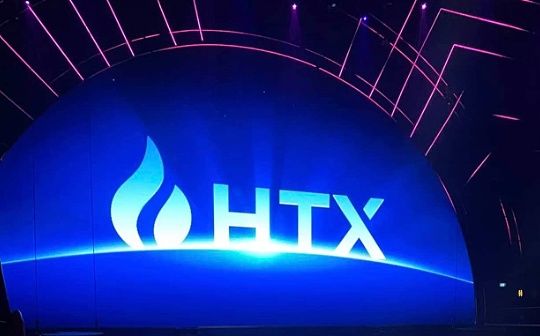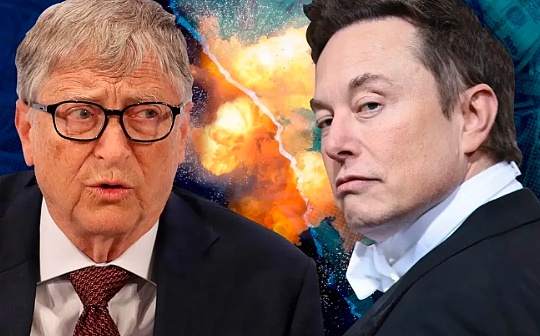
Source: Silicon Rabbit
On November 4, Beijing time, the 60th presidential election in the United States is about to be announced, and former Republican President Donald Trump will hold a final battle with Democratic Vice President Kamala Harris.
The US election has always been the focus of the world, but this year, the Silicon Valley people hidden behind the scenes have turned out to go to the podium of the candidates’ rally and personally promoted the direction of the election.
Dozens of Silicon Valley investors including Microsoft founder Bill Gates, famous venture capitalist Marc Andreessen, PayPal Peter Thiel and others ended up and bet on the future.As Elon Musk openly stood on the stage of Republican Trump, Silicon Valley, which had been loyal to the Democratic Party for decades, also showed a trend of division due to different party tendencies.
Why do people in Silicon Valley bet on major candidates?How will the U.S. election change affect Silicon Valley?In the next four years, can the innovation trend in Silicon Valley continue to flow freely?We may be able to find out from the speech and policy tendencies of the two candidates during the recent campaign.
1. Silicon Valley “rebelled” Democratic Party, Musk “fighted” Bill Gates
“The enemy of the enemy is a friend.” Over the past four years, Musk has obviously figured it out.
It is hard to imagine that Musk, who is now a brother to Trump, once regarded him as a “cold loser” and even resigned from the Economic Advisory Committee because of his election as president.But four years later, Musk reiterated that Trump was a “tough president” and became the first tech madman in Silicon Valley to publicly support Trump.
What prompted Musk and Trump to come together was their common enemy, the Democratic Party.
与其说硅谷大佬们真心实意支持共和党,不如说,他们更讨厌拜登执政期间一系列影响硅谷的科技政策——提高税收、加强监管、拆分巨头、反垄断调查等等,这些都切实威胁To the actual interests of Silicon Valley bosses.In contrast, the Republicans have instead posed a slogan of innovation freedom and reducing government intervention.
For a time, people in Silicon Valley couldn’t tell whether the Democratic Party, which had always supported innovation, had become conservative, or the conservative Republican Party became open.
But with Musk personally entering the game, the political landscape in Silicon Valley has also quietly changed, and the party conflicts under the undercurrent have also emerged. The camps supporting different political parties are splitting Silicon Valley.
Silicon Valley people who support the Democratic Party believe that the Democratic Party’s immigration policy, advocating investment in scientific and technological innovation and improving scientific and technological education are basically consistent with the Silicon Valley spirit in general.At the same time, they are worried that Trump’s populist economic policies will intensify greater social conflicts.
Both factions have their own opinions, but there will only be one final winner in the election.In order to win, the big bosses of both sides tried hard to spend money, time and resources to support the party they support to gain power.
Musk has donated at least $75 million to his pro-Trump organization America Pac, and even proposed a “vote and pay” campaign; Joe Lonsdale, co-founder of AI startup Palanti, personally promoted the fundraising of America Pacand voluntarily donated $1 million.In addition, Sequoia Capital investor Shaun Maguire, cryptocurrency venture capitalist Cameron Winklevoss and Tyler Winklevoss both turned against the Trump camp and provided millions to tens of millions of financial support.
“拜登给硅谷提供了许多反对的理由:他的财政部计划对未实现资本收益征税,终结了美国自由企业制度;联邦贸易委员会经常欺负左翼不喜欢企业,减缓交易速度并损害创新,对Startup founders and employees are a nightmare,” said Joe Lonsdale, co-founder of Palanti.
Cryptocurrency venture capitalist Cameron Winklevoss feels that those who support Bitcoin, cryptocurrency and commerce should invest in Trump, who will end the Biden administration’s suppression of cryptocurrency.
Harris’ supporters are not to be outdone, Bill Gates revealed that he recently donated about $50 million to nonprofits supporting Harris’s presidential election.Y Combinator investor Jessica Livingston donated $5 million; Ripple co-founder Chris Larsen donated more than $11.8 million.It is reported that Kamala Harris has raised nearly $1 billion in huge campaign funds in the past three months.
Those who support Harris believe that the Democrats still have room to save.Compared with Biden, Harris is able to better understand the innovative economy and promote the US’s competitiveness in the global market.“我们非常认同哈里斯的经济理念,现在的时代要鼓励创新,并确保美国头部企业在全球各行业中占据主导地位。”Ripple联合创始人Chris Larsen认为,哈里斯在创新经济下成长,她It will correct the mistakes made by the Biden administration in cryptocurrency policy and play a key role in the direction of innovative economy.
It is not only the people in Silicon Valley that pushed the election to its climax, but also the social technology platforms in Silicon Valley.
In addition to X and Instergrams that appeared in previous years, Tiktok and podcasts have become the main battlefields of the new election public opinion war, which means that the social media vane has changed.
“我认为,每次总统选举都是媒体格局的一个缩影。”Vox Media高级副总裁RayChao提到,2008年大选的主战场——Facebook、2016年大选的主战场——Twitter。
This time, accurate algorithm recommendations, endless hot content, and overlapping user groups have driven Tiktok to become a new battlefield for the 2024 election.Harris has attracted about 4.2 million followers on TikTok, and Trump’s single video on TikTok also has a maximum of more than 9 million views.
In addition, podcasts have become a new platform for politicians to “fireside conversation” with voters.According to incomplete statistics from Silicon Rabbit, Trump has participated in at least 20 podcasts, while Harris has participated in at least 6 podcasts.Both presidential candidates are further elaborating on podcasts about their blueprint for the future of the United States.
Not only that, a survey by non-profit organizations supporting Harris showed that online emoticons have also become one of the more contagious ways of expression, and the new communication method will better promote the views of their own political parties.
To some extent, Silicon Valley, which is closely related to technology, is swaying the direction of the US election.
2. Silicon Valley no longer innovates?Three hot topics become the key
Personal destiny is closely linked in the era in which they live, and Silicon Valley is no exception. This US election will determine whether Silicon Valley’s innovative spirit can continue to grow freely.
拜登执政四年期间严加打击加密货币,且加强审查初创公司被收购流程,都从一定程度与硅谷内鼓励冒险、宽容失败的风气背道而驰,引起诸多不满。
Against this background, the new candidate’s attitude towards cutting-edge innovative technologies has become the focus of people’s attention in Silicon Valley.From the speeches of the two candidates in public at rallies, interviews, and podcasts, we can see their attitudes towards artificial intelligence, cryptocurrencies, energy and climate at this stage.
1. Artificial Intelligence: Who will supervise the risks of AI development?
美国大选恰逢生成式AI爆发强劲时期,此前硅谷内的人们早就围绕着对超级AGI的监管程度争论不休,下一位总统对AI态度,或许成为打破现有局面的关键。
Silicon Rabbit Jun sorted out Harris and Trump’s views on AI at different times through public information:
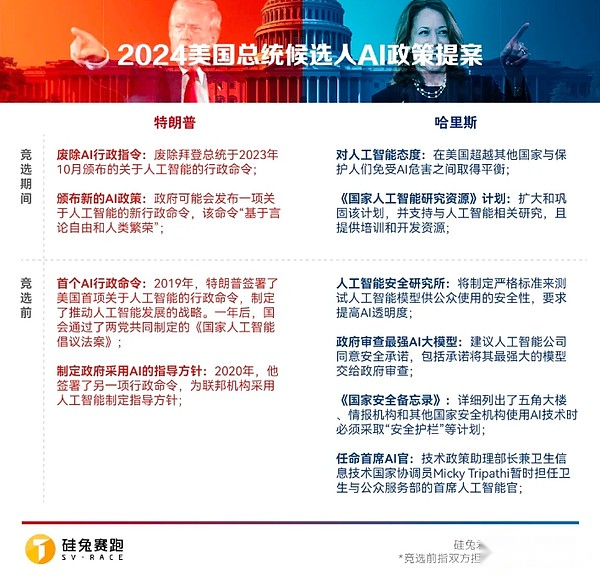
No matter who wins in November, the new president will be at a critical moment in formulating artificial intelligence policies, and the government’s support for technological innovation will also affect the growth of some small businesses in Silicon Valley.
从现有发言来看,哈里斯整体将会延续拜登-哈里斯政府时期在人工智能发布的政策,包括人工智能研究所、《国家安全备忘录》等政策,选择对AI企业进行一系列适度监管, beware of AI risks.
In contrast, Trump has transferred the technical supervision power to the company itself, which will increase the channels for capital entry or exit to a certain extent, stimulate investment in AI startups, and promote the development of AI.
2. Cryptocurrency: Spend $200 million, and the currency circle chooses to “revenge” the election
During the last election campaign, cryptocurrency and niche hobbies in the currency circle, neither Trump nor Harris were optimistic about the development of cryptocurrencies.
Four years later, everything changed.The survey shows that during the election, nearly half of the donations of the two candidates came from cryptocurrency companies, with crypto companies Coinbase and Ripple becoming the main force, with a total of more than US$200 million.
It can be said that after being suppressed by the Biden administration for nearly four years, cryptocurrency entrepreneurs have deeply understood the importance of policy support, and they also expect the new president to be a candidate for cryptocurrency rather than like Biden.cryptocurrency doubters.
Apparently, with the strong support of cryptocurrency entrepreneurs, both Harris and Trump have changed their views on cryptocurrencies and actively embraced cryptocurrencies.The Biden administration may become the last U.S. government to oppose cryptocurrency.
Here are Harris and Trump’s views on cryptocurrencies:
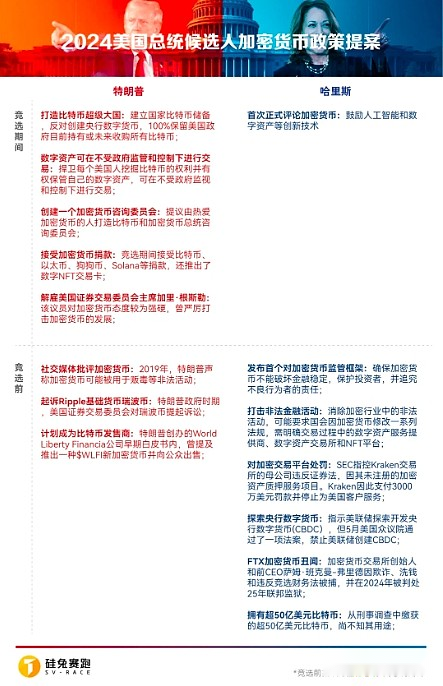
In the early stages of the campaign, Harris, the Democratic Party, had not made any official comments on cryptocurrencies, which also shows that there is some controversy over cryptocurrencies within the party. It was not until September that Harris revealed that he would relax his attitude towards cryptocurrencies.This means that the Democrats still have a certain cautious attitude towards cryptocurrencies and choose to moderately encourage Bitcoin innovation while maintaining the interests of relevant investors.
Trump’s Republican Party is a staunch supporter of cryptocurrencies and will vigorously promote the development of Bitcoin.Both Trump himself and his vice presidential candidate Vance hold cryptocurrency.It is revealed that Vance owns up to $250,000 worth of Bitcoin.
If Trump succeeds in taking office, cryptocurrencies may be regarded as a reliable asset and will be used in some traditional investment portfolios in the future.If global investors follow the example of the United States and include Bitcoin in the mainstream investment method, they will continue to push up the price of Bitcoin.As of November 1, the price of Bitcoin climbed to $73,000, close to an all-time high.
3. Energy and Climate: Harris’ New Energy VS Trump’s Traditional Energy
Energy has always been the source of driving force for national and social development, and energy shortage is one of the key issues that the United States urgently needs to solve at present.The development of innovative technologies and the support of energy policies will affect the future transformation of supply and demand in the US energy market.
Now, in the face of the new energy problem, how will the two candidates balance?Here are Harris and Trump’s views on energy and climate:
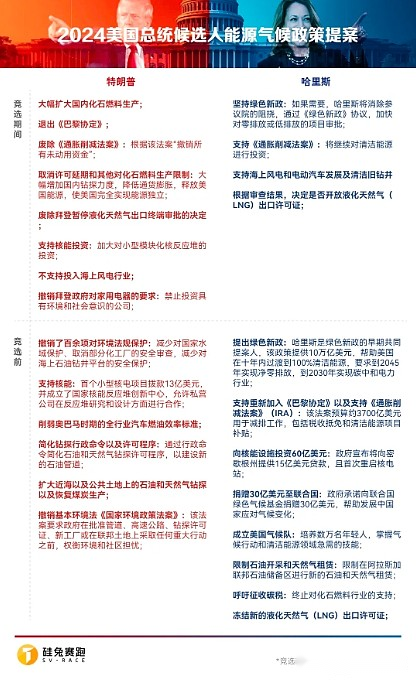
In terms of energy and climate, both candidates hope to expand energy production to lower prices, but have made almost completely different choices on the technology route.Harris is obviously more inclined toward clean energy and promote the development of clean energy technology, which prompts enterprises to achieve low carbon emissions and zero emissions.
But Trump hopes to abolish a series of regulations that hinder oil and gas drilling and coal mining, and increase efforts to promote the extraction of traditional energy to meet the demand for energy growth.
No matter who wins the election, nuclear energy companies should be able to receive support in the future, but some startups that focus on clean technology and clean energy may be deeply influenced by the candidate’s style.
3. Is there any change in the final judgment?Technology giants are waiting for a new turnaround
Silicon Valley giants, like startups, are waiting for their boots to land.
They face another problem: endless lawsuits, countless supervision, endless taxes and fees… Whether it is industry rookie OpenAI, or Silicon Valley giants Nvidia, Apple, Amazon, Meta, Google, whether it is industry rookie OpenAI, or industry giants Nvidia, Apple, Amazon, Meta, GoogleThey are all caught in the Biden administration’s lawsuits and supervision.
In March this year, the U.S. Department of Justice, in conjunction with 16 states and the District of Columbia, suing Apple for monopoly, accusing it of using illegal anti-competitive behavior to achieve the dominance of the iPhone.In the same year, the Federal Trade Commission and 17 states sued Amazon in court, accusing Amazon of abuse of its market position and unfairly promoting its own platforms and services, which damaged fair competition, and Google was even in a split crisis for a long time.
Will the newly appointed president continue to continue Biden’s style, or will he let these giants go?We will see from the three major directions of monopoly, taxation and technical support what changes the US election will bring to the giants in Silicon Valley.
1. Monopoly: Facing corporate splits and sky-high monopoly fees, are the giants doomed?
From a historical perspective, the US government’s supervision of technology giants has been continuously strengthening, and the relationship between the government and enterprises has become increasingly tense.Now, the giants in Silicon Valley have basically been sued by the Biden administration. Many antitrust lawsuits and frequent investigations have caused headaches for large companies in Silicon Valley.Even Google’s current CEO Sundar Pichai has to admit that Google will be trapped in antitrust lawsuits and appeals for “years”.
During this election campaign, the two candidates avoided discussing antitrust attitudes towards technology giants and simply expressed their views on technology supervision.
But under the undercurrent, tech giants also gained a turnaround. According to the latest reports, democratic parties have privately revealed that they have received some support from Google and other large tech companies. Harris may take “minor penalties for some existing lawsuits” for some of the existing lawsuits.”measure.
Here are Harris and Trump’s views on antitrust and regulation of tech giants:
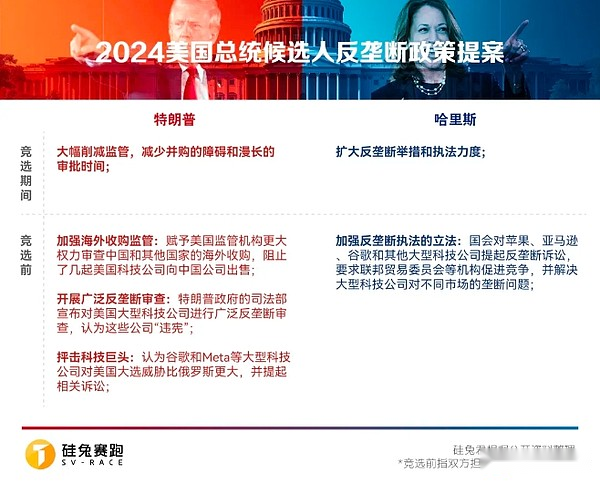
In terms of monopoly, almost both candidates have adopted a broader scrutiny of tech giants.However, Harris’ relevant policies are more inclined to prevent large technology companies from over-expansion and give startups more room to survive.
Trump continues his previous style of governing, advocates free market policies in the economic direction, encourages companies to compete on their own, and promotes economic development.
There is not much difference in the antitrust attitudes between the two, but the measures and methods are taken.But in terms of regulation, the two candidates are completely different.Harris continues to attach great importance to the regulatory style during the Biden administration and issues such as user privacy and data security.But Trump believes that some technical security issues should be left to companies to solve themselves without excessive intervention.
2. Taxes: Harris’s tax increase policy PK Trump’s tax cut policy
Tax issues have always been one of the must-answer questions during the election campaign for previous U.S. presidential candidates.This time, both candidates explained their future plans for taxation in detail.
If policy proposals during the campaign are implemented, then Harris’ tax plan will become the 15th largest tax increase since 1940 and the sixth largest tax increase plan in the same period except during the war. In addition to the tariff part, Trump’sThe tax plan became the sixth largest tax cut since 1940.
Here are Harris and Trump’s views on taxes:
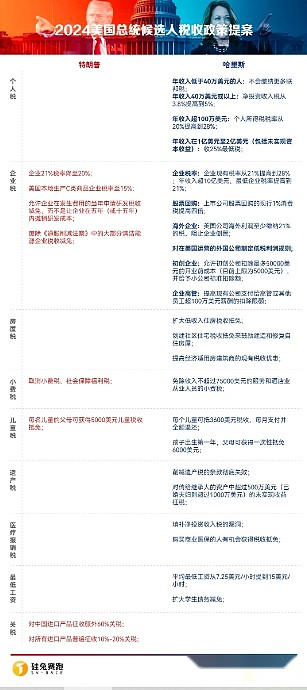
Harris said in the campaign that she would build the middle class by raising taxes for the richest 1% of the U.S. population while cutting taxes for all other income groups.
Trump chose to cut a series of local taxes in the United States and turned to overseas companies or products to significantly increase taxes.
Judging from the tax policies during Trump’s administration, he should continue to relax economic policies on the energy, finance, healthcare, infrastructure and agriculture sectors, but the costs of cross-border transactions will rise significantly.
The high-income and corporate population in Silicon Valley are undoubtedly more favorable to the Republican Trump policy and will promote more financial investment.The tax policy of the Democratic Party Harris is targeted for high-income people and is beneficial to the vast majority of middle- and low-income groups.
3. Technology investment: Can funds and talents flow smoothly to Silicon Valley?
Silicon Valley is not only the companies here that are famous all over the world, but also because it gathers more high-end technical talents and sufficient funds to explore more possibilities.The country’s cultivation of technical talents and capital investment will also promote the innovative development of Silicon Valley.
Here are Harris and Trump’s views on technology investment during the campaign:
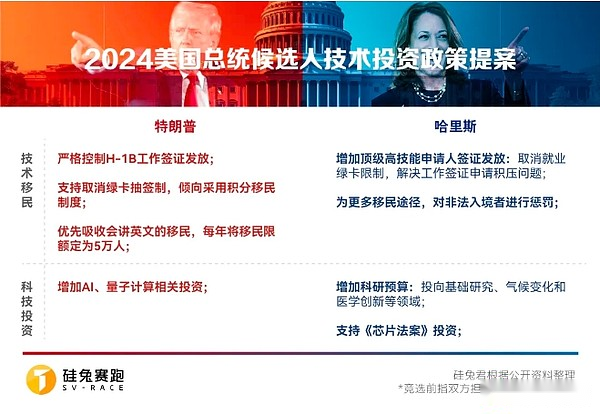
Technological innovation in Silicon Valley has always been inseparable from talents and funds.The control of skilled immigration during Trump’s administration has also increased the difficulty of enterprises in Silicon Valley to a certain extent.Harris has always encouraged more talents to flock to the United States to solve the problem of labor shortage in the United States.
Silicon Valley may usher in a golden period of development
As the center of global scientific and technological innovation, Silicon Valley naturally cannot do without a stable policy environment to support its development and innovation.Judging from the signals released by the two candidates, they both hope to push the United States’ technological strength to further strengthen and are willing to provide more financial and policy support. Silicon Valley may usher in a golden period of development.
However, both have their own emphasis on the direction of support.Harris focuses on supporting talents and providing funds, but at the same time requires supervision of giants to increase tax revenues for high-income enterprises and people.Trump is willing to cut taxes and support the traditional energy industry, but he is trying to increase tariffs and reduce cross-border transactions.
The policy tendency of presidential candidates only shows to a certain extent that their future plans have limited impact on Silicon Valley, because companies in Silicon Valley value specific policies implemented by state governors.
No matter how the policies of the two parties change and differ, the general directions of attaching importance to market mechanisms, making enterprises the main body of innovation, and increasing investment in basic research have not changed.With the slow recovery of the economy after the epidemic, the global economic trend will have a more profound impact on the overall trend of scientific and technological innovation and technology investment, and the overall positive trend is unstoppable.

